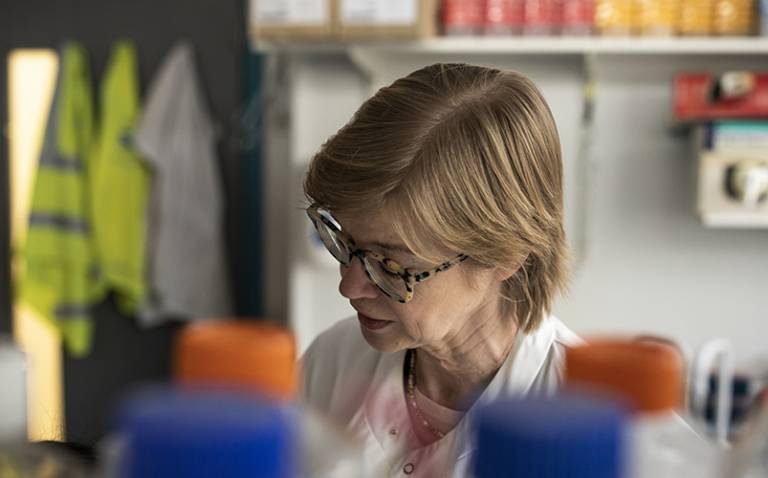We speak to Virginia Calder, Professor of Ocular Immunology at UCL Institute of Ophthalmology, about her career and her unique Research Pathways in Advanced Therapeutics MSc programmes.

Tell me more about your background – it would be great to find out more about your education and career so far.
I am an immunologist who moved to London to undertake a PhD a very long time ago. My supervisors were based in two departments across the UCL campus, one of whom was a leading immunologist with an international reputation. He went on to develop the first-ever biologic – anti-TNF (Infliximab) - for treating patients with Rheumatoid Arthritis. It was a very exciting time to be part of that group and taught me a lot about developing lab-based experiments into clinical use, and the various skills required in translational research.
Why should a graduate pursue a career in Advanced Therapies, and why do you think a programme like this is needed?
During the recent pandemic, understanding the clinical problems and developing a vaccine to protect millions of individuals from suffering the most severe effects has allowed us to start to return to our normal lives. However, for many diseases, there are no treatments or cures, and many patients live in the hope that one day soon there will be a new discovery that will lead to them having an improved quality of life. Pursuing a career in advancing therapies would harness the desire to make a difference to people's lives - whether by focusing on lab-based research within a university or pharma setting, or working as part of a clinical trial to test a new treatment, or writing articles to raise funding or to promote new developments.
What is unique about the Research Pathways in Advanced Therapeutics (RPAT) MSc and the Research Pathways in Advanced Therapeutics (with Practice) MSc at UCL and what are the main differences between the two programmes?
The one-year RPAT programme is unique in teaching all the necessary knowledge required to advance therapies, providing two terms of taught modules with a final term undertaking a lab-based project. Since the modules are delivered by a range of UCL departments, there is an opportunity to learn from a wide range of experts, network with students from other courses, while receiving supervised lab experience, while developing presentation skills.
The Research Pathways in Advanced Therapeutics (with Practice) MSc at UCL, follows the same learning schedule in the first year as described above for RPAT but then students spend two further terms undertaking a more in-depth lab project in an overseas institution, or within the UK if preferred. Currently, we have agreements in place with hosts in Australia and Singapore, and several universities in Japan are planning to sign up very soon.
What are you looking for in ideal candidates that apply to these programmes?
Ideally, students will have recently graduated with a biomedical-related science degree and are keen to ‘make a difference’ by understanding more about working in a therapeutics area. They might be considering a future career in research but are not sure if they wish to study for a PhD or they might wish to gain more lab experience before deciding which career path to follow.
Can you share some examples of the types of research/lab projects students on the MSc programme have worked on?
In this first year of the RPAT courses, our students have just started their lab-based projects. One is working with Dr Amanda Carr on CRISPR editing of induced pluripotent stem cells from patients with late-onset macular degeneration. Another project underway in Dr Emily Eden’s lab is ‘Targeting lipid biosynthesis for inhibition of SARS-CoV-2 replication’ and there are several others in different areas involving a wide range of techniques.
What careers do you envisage RPAT graduates pursuing?
I envisage an RPAT graduate joining a professional clinical trials department, perhaps embedded within the NHS, where they join an administrative team to facilitate a number of clinical trials, and then become more specialized in a particular disease area.
Our graduates may also pursue a PhD in a biomedical science department, eventually entering the Pharma space where they develop a new cancer treatment.
Links
- Prof Virginia Calder’s research profile
- Research Pathways in Advanced Therapeutics MSc
- Research Pathways in Advanced Therapeutics with Practice MSc
- Read our RPAT student testimonial: Jazmin Desireth Reyes Martinez
- Read our RPAT student testimonial: Sunil Timilsena
- New student placement opportunity at the Singapore Eye Research Institute
- New student placement opportunity at Australia’s Children’s Medical Research Institute
 Close
Close

